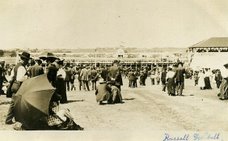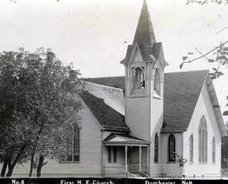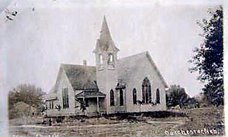We last reported on the Burden family's impact in 2015, when students from Arlington (Neb.) High School spent hours at the Saline County Museum to research the Burdens' story.
 At that time, the Arlington Citizen reported that AHS students explored the Burden house (now located on the museum grounds), which sheltered Henry Burden, his wife, Mary, and their seven children. The students even made their way up to the attic, which is where the Burden children slept. (Click here for an Omaha World-Herald story on the Arlington students' research efforts.)
At that time, the Arlington Citizen reported that AHS students explored the Burden house (now located on the museum grounds), which sheltered Henry Burden, his wife, Mary, and their seven children. The students even made their way up to the attic, which is where the Burden children slept. (Click here for an Omaha World-Herald story on the Arlington students' research efforts.)Burden, a former slave, served in the Union Army during the Civil War after escaping from the South. He went to Wisconsin, enlisted in the 17th U.S. Colored Troop Regiment and served a year before being honorably discharged. He made his way to Lincoln and then to the Dorchester area.
The Arlington students hoped to prove that Burden was an escaped slave to be able to include his house and burial site in Pleasant Hill Cemetery on the National Park Service’s "Network to Freedom," a national registry for sites associated with the Underground Railroad. (The Times has been unable to confirm if the students were successful, although to our knowledge, the Burden home is not yet listed on the registry.)
 According to the reports from 2015, Judy Rada, then-president of the museum board, said: “I think it’s fantastic that we have young people that are as interested and enthused as these kids are, and a teacher who is willing to go to these steps to keep the kids involved in history.”
According to the reports from 2015, Judy Rada, then-president of the museum board, said: “I think it’s fantastic that we have young people that are as interested and enthused as these kids are, and a teacher who is willing to go to these steps to keep the kids involved in history.” Rada helped the students photocopy document after document. Rada also told them different stories about Henry. He and his family were the only black family in the county, she said, but they were treated like any other family. “The reason he was so well accepted,” Rada said, “was because he knew all of his neighbors were Czech. He learned to speak Czech.”
The Burden children attended school in Pleasant Hill. Documents the students found noted that the school was integrated in the late 1800s. Today, Rada said, not many people know the story about Henry Burden and his house. “Not as much as they used to,” she said. “We definitely point it out to anyone who comes. We make sure they see it and they are aware of the history that is involved with it.”
With documents in hand, the students followed Rada to the Burden House, which sits just to the west of the museum's main building, along with an old schoolhouse, log cabin and train depot. The group then met Larry Kaspar, the sexton of the Pleasant Hill Cemetery, where Henry Burden, his wife, and two sons are buried.
Burden, who passed away in October 1913 at age 76, is buried on the south side of the Pleasant Hill cemetery, as a large ornate headstone designates his resting place. His funeral was attended by the entire Pleasant Hill community.



















































Actually his family plot is nearer the south west corner of the cemetery.
ReplyDeleteI'm very impressed with this teacher. Sounds like a great motivator, willing to travel nearly 100 miles to give his students such a wonderful opportunity to explore history. We need more like him.
ReplyDeleteAnd by the way, the Saline County Museum is an awesome place with great, knowledgeable volunteers. You can spend all Sunday afternoon there and not see it all. Too bad more local people do not avail themselves of this opportunity.